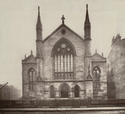 Sir Samuel Chisholm (1836-1923), Lord Provost between 1899 and 1902, was one of Glasgow's most formidable and outspoken civic politicians. A radical Liberal, he was associated with such controversial causes as municipal enterprise, temperance reform and Scottish Home Rule. Born and educated in Dalkeith, Midlothian, his father was a tobacco manufacturer. Chisholm commenced business in Dalkeith as a wholesale grocer, a successful enterprise, which by 1870 was operating from Glasgow.
Sir Samuel Chisholm (1836-1923), Lord Provost between 1899 and 1902, was one of Glasgow's most formidable and outspoken civic politicians. A radical Liberal, he was associated with such controversial causes as municipal enterprise, temperance reform and Scottish Home Rule. Born and educated in Dalkeith, Midlothian, his father was a tobacco manufacturer. Chisholm commenced business in Dalkeith as a wholesale grocer, a successful enterprise, which by 1870 was operating from Glasgow.
 Chisholm's political outlook was strongly influenced by his evangelical religion. He belonged to the United Presbyterian Church and was a prominent member of the Kent Road congregation, noted for its commitment to social outreach. In 1888 he was elected to Glasgow Corporation as town councillor for the Woodside ward. Three years later he became convener of the City Improvement Trust where he pioneered a programme of municipal house building. Chisholm's aim was to improve working class living standards, but he also alienated private sector builders and landlords who resented municipal interventionism.
Chisholm's political outlook was strongly influenced by his evangelical religion. He belonged to the United Presbyterian Church and was a prominent member of the Kent Road congregation, noted for its commitment to social outreach. In 1888 he was elected to Glasgow Corporation as town councillor for the Woodside ward. Three years later he became convener of the City Improvement Trust where he pioneered a programme of municipal house building. Chisholm's aim was to improve working class living standards, but he also alienated private sector builders and landlords who resented municipal interventionism.
 The beer, wine and spirit trade was another group that became bitterly hostile to Chisholm. In common with American temperance crusaders, Chisholm was convinced that wholesale prohibition of alcohol would direct people into more wholesome and "rational" social activities. As a first step in Glasgow, he advocated draconian restrictions to the licensing laws. By 1902 the Lord Provost's policies had made his critics so concerned about the consolidation of civic control that they combined forces to ensure his defeat in that year's municipal elections. Chisholm never returned to the Corporation, but remained influential in the Liberal Party. He was knighted in 1901.
The beer, wine and spirit trade was another group that became bitterly hostile to Chisholm. In common with American temperance crusaders, Chisholm was convinced that wholesale prohibition of alcohol would direct people into more wholesome and "rational" social activities. As a first step in Glasgow, he advocated draconian restrictions to the licensing laws. By 1902 the Lord Provost's policies had made his critics so concerned about the consolidation of civic control that they combined forces to ensure his defeat in that year's municipal elections. Chisholm never returned to the Corporation, but remained influential in the Liberal Party. He was knighted in 1901.